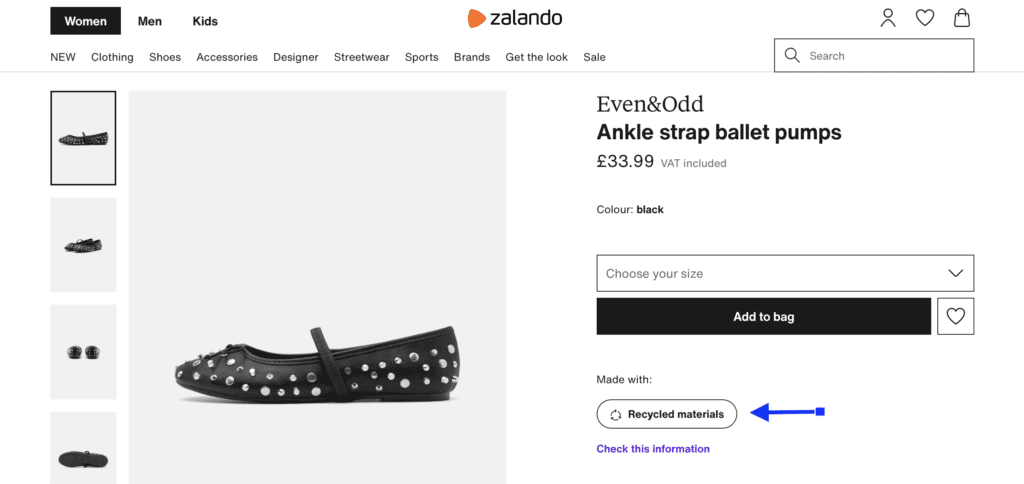Zalando plans to make significant changes to the way it promotes the so-called sustainability of its products following consultation with European Union regulators. The European Commission said in a statement Thursday that Berlin-based Zalando, which offers a wide range of apparel, footwear and accessories through its e-commerce platform, “removed misleading sustainability flags and icons displayed next to its products. be provided on the platform by April 15, 2024, as such claims “may mislead consumers about the environmental properties of the product.” is required. Instead, the EU market regulator said Zalando provides consumers with “clear information about the environmental benefits of its products, including the proportion of recycled materials used.”
Specifically, the European Commission, which is also tasked with ensuring the proper application of EU law, has made it clear that Zalando has committed to: (1) Remove the originally used sustainability flag from all web pages. (2) remove any misleading environmental icons (such as leaves or trees) displayed next to the product; (3) The icon and the term “sustainability” will also be removed from the filter, allowing consumers to filter and select products based on specific product qualities.
In addition, Zalando has committed to: (4) “Provide clear and specific information on the product detail page about the environmental and/or ethical benefits of the product” and (5) create two new web pages. Introducing and revising the “Sustainability Page” (including one additional web page with information on product standards and information on Zalando's sustainability-related approaches and strategies). (6) Ensuring that environmental claims are “based on aspects of environmental significance.''

But perhaps most interestingly, Zalando will no longer use the term “sustainability” or “other unfair terms denoting environmental and/or ethical benefits” and will instead ” “Provide clear information about the situation.'' For example, a percentage figure of how much recycled material is used. ”
Although it appears not to be limited to a single initiative on Zalando's part, retailers are now required to submit a report on the fulfillment of their commitments to the Commission, which will then be evaluated by the Consumer Protection Cooperation Network. “We will enforce compliance, for example, by imposing fines or removing content, if necessary.”
The parties agree that the Consumer Protection Cooperation, the European Commission, and the four authorities of Germany, Denmark, Norway, and Sweden have announced in April 2022 that they have begun “coordinated action with Zalando.” He did not reveal much about the background behind his sudden change in attitude. By way of background, the European Commission said on Thursday that under EU rules, “companies must provide consumers with truthful information and refrain from misleading consumers in order to influence their choices.” “We must refrain from doing so,” he said, suggesting that the promise was actually the result of a focused study. About the authenticity of Zalando's sustainability-centered marketing.

The apparent investigation into Zalando comes several years after the European Commission conducted a thorough investigation into hundreds of websites in 2021. The EU revealed that “green” claims displayed by apparel/accessories, cosmetics and household goods companies were made in 42 per cent of cases. The EU website is “exaggerated, false or deceptive”. The commission said it subsequently examined 344 “seemingly dubious claims” and found that “in more than half of the cases,” companies making sustainability claims “are difficult for consumers to judge the accuracy of the claims.” It was found that the company did not provide sufficient information. Meanwhile, in 59 percent of cases, the company “did not provide easily accessible evidence to support its claims.”
In relation to this headline-grabbing market investigation, the European Commission found that in 37 percent of cases, potentially problematic claims included “vague and general statements” about the product. discovered. The European Commission said this was wording aimed at “conveying to consumers an unfounded impression that the product does not have a negative impact on the environment”.
Overall picture: The action against Zalando is coupled with the European Commission's apparent willingness to use EU rules on unfair commercial practices to help national enforcement officials curb a wide range of unfair commercial practices. This should serve as a warning to retailers and fashion industry organizations. Focus on the area of sustainability in advertising/marketing to reach environmentally conscious consumers. Based on the measures currently in place, the possibility of regulatory intervention would limit the publication of potentially misleading objective claims, such as the recyclability of a product or its components or claims that a product is “environmentally friendly.” It doesn't just come from it. ” content (necessary evidence/qualifications are missing). Regulators may also take issue with the use of generic eco images and icons, or even the use of highly ambiguous terms such as “sustainability.”


